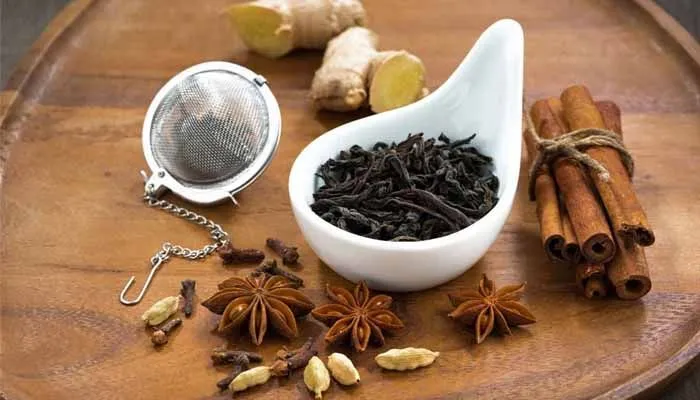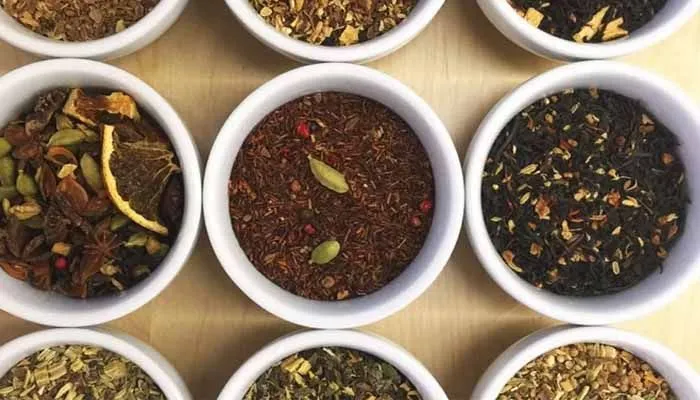
The name Chai tea is nothing more than a redundancy in itself, since Chai means in Hindu “infusion” or “tea”. However, it is the most well-known form for the Western world of Masala chai, a drink originating from India in which various spices are mixed together with aromatic herbs.
For the preparation of Masala chai is combined products of strong character and pronounced flavor, such as cloves, ginger, cardamom or saffron, leave a taste that remains for a long time in the mouth and spicy touches. This drink was traditional in the Indian upper classes, but it has gradually become standardized and consumed by everyone.
Research developed over the years has shown the benefits of chai tea for reducing digestive problems, balancing blood levels and improving cardiovascular health. In some articles we have already addressed the potential of each of the spices and plants that are part of the Masala chai, but added together in a single product, a singeric effect is created with a great potential for health.
In this article we want to analyze what are the benefits of chai tea for the body, through different clinical trials and research carried out on this popular Indian drink.
Table of Contents
What exactly is chai tea?
Chai tea or also known as Masala chai is an infusion of sweet taste and spicy touches widely consumed in India and increasingly widespread in other countries. It has a great aroma when taken hot.
There are different ways to prepare it, and each family has its specialty or adds different spices, although the following predominate as important:
As a base, you can use water or a little warm milk, softening the mixture and providing a sweeter flavor.
Benefits of Chai Tea for health
Added to all the extracts of plants and spices commented, among them there is a synergistic effect, since all have been analyzed and studied for their potential for health. However, let’s look at the actual studies there are on the benefits of Chai tea.
The good thing about a drink made up of so many ingredients is that the basis of the benefits can be very broad, although it will vary depending on the concentration of each of them and the way of preparing it.
May help improve heart health
Cardiovascular health involves controlling many variables. Some of them are keeping bad cholesterol (LDL), triglycerides, having a good reserve of antioxidants, and controlling blood pressure, among others.
There is scientific evidence of the benefits of Chai tea for the heart, especially in the reduced blood pressure, as some primary animal studies have shown. In them, and The main agent is cinnamon, which has benefits against diabetes and blood pressure.
This component also acts favorably in the reduction of bad cholesterol (LDL) and triglyceride levels, with reductions of up to 23-30% for the latter case.
However, it should be noted that these studies have been conducted for a dose of between 1 and 6 g of cinnamon daily, which is a very high amount, and a cup of Chai tea has much less than the specified amount.
However other recent studies have concluded that a dose of 120 mg daily may be beneficial for acting positively on cardiovascular health.
Another interesting ingredient for the health of our heart is black tea, as it has direct activity to reduce blood cholesterol levels. [See study]
This infusion also offers a slight reduction in blood pressure in cases of hypertension, but it is necessary to drink 2 to 3 cups of black tea a day, being associated with the reduction of up to 11% of suffering from some type of heart disease. [See study]
The biggest problem today is to make the mistake of associating the benefits of each ingredient with the benefits of chai tea, since the amounts used of each product is different, and that greatly conditions the final result. Therefore, more research is needed, but the current one is interesting to take this fantastic Indian drink.
Chai tea may lower blood sugar levels
Although we have already given some brushstrokes about the potential of some of the ingredients of chai p teaTo balance blood sugar, it is interesting to use this type of health-friendly beverage to seek a benefit along with the use of modern medication.
Foods such as cinnamon or the ginger may have beneficial effects on blood sugar balance, thus favoring patients with type II diabetes.
Some studies show increased fasting insulin resistance with regular cinnamon consumption, with responses greater than 10%. An increase in insulin resistance reduces the blood sugar spikes typical of poor pancreatic activity and allows levels to be maintained much more balanced.
Ginger acts in parallel to cinnamon, so it is also an ingredient that brings many benefits to chai tea. Primary studies looked at a reduction in blood sugar of up to 12% in people with type II diabetes.
A recent study gave two grams of ginger powder per day to people with type 2 diabetes and found that it helped them lower their blood sugar levels by up to 12% (13 Trusted Source)
Studies report that effective doses of ginger and cinnamon tend to range from 1 to 6 grams per day. Such doses are more than you can expect to get from store-bought chai tea bags, or from a cup prepared by your local barista. [See study]
In any case, if we want to take advantage of the benefits of chai tea to improve diabetes, we can never use sweeteners with harmful effect for this disease. Some of the recommended sweeteners for diabetes are as follows:
The main recommendation of the Health Authorities is to try to reduce the consumption of sugar up to 25 grams per day. Remember that this is not only about not taking pure sugar, but also reducing the consumption of foods that include sugar in the manufacturing process.

May reduce nausea and improve digestion
Many of the ingredients commonly used for the preparation of Chai Masala improve gastrointestinal activity and reduce pain derived from stomach inflammation, heartburn and stomach heaviness.
It can also have a reducing effect on the feeling of nausea, especially ginger, whose consumption is recommended during pregnancy, with several multidisciplinary and international studies that support its results.
This amount is usually used in the preparation of a cup of chai tea, so its benefits are assured.
Other beneficial ingredients for digestive health are cinnamon, cardamomom, pepper and cloves, all of them with antibacterial activity, so it reduces the negative effect of bacteria that cause infections, such as gastroenteritis.
Pepper also contains active ingredients that increase the production of gastric juices, facilitating the digestion of heavy meals. [See study]
In this case, it is true that much higher amounts are needed than those usually present in Chai tea, so its direct benefits are not applicable to this drink, and more studies are needed to check if with lower doses significant effects can be had.
May promote weight loss
What relationship can Chai tea have with the loss of fat and body mass? There are several guidelines to ensure this statement. One of them, and the most important, is the feeling of satiety that comes from consuming a drink like this, with very low calorie intake. The presence of different components in Chai tea increases the feeling of fullness and makes us spend more time without consuming unhealthy foods.
Therefore, it can be taken in the middle of the morning or in the afternoon, when there are peaks of hunger and we usually go to the refrigerator or pantry to rescue foods that may not be beneficial, because they contain excess fats and sugars.
On the other hand, some elements of Chai tea increase the metabolic activity of the body and accelerate the breakdown of fats. Many of these properties are associated with the frequent consumption of black tea, so it is also advisable to incorporate it into our eating habit.
To promote weight loss, we must add fatty ingredients such as milk or provide sugars to our infusion. Can use skimmed milk or use sweeteners.
What is the recommended consumption dose?
More studies are still needed to conclude a key and specific dose to take advantage of all the benefits mentioned. Most of the trials we have seen have been associated with the consumption of a specific ingredient (saffron, pepper, ginger, cardamom, etc.), but not all of them added together and to a specific amount.
Drinks with black tea also provide caffeine, so you have to take into account the sensitivity of many people to this chemical compound.
Read more: Is it possible to drink tea without theine?
The maximum recommended caffeine intake is 400 mg daily. During pregnancy, you should avoid consuming more than 200 mg
In general, a maximum of 2 or 3 cups a day is recommended to take advantage of its benefits and not have any side effects.
How to prepare tea chai at home
The most important thing of all is to have the facility to be able to take advantage of the benefits of chai tea at home, directly, without having to look for it, at a higher price, in specialized cafes.
This infusion is easy to prepare, and all we need is to have availability of all its ingredients, which are quite common and used almost daily at home. This recipe is one of many that we can find on the internet, since as we said at the beginning of the article, there are many ways to prepare it, and each family does it in their own way and according to their tastes.
For an approximate amount of 2 cups:
- 5 whole nails
- 20 whole black peppercorns
- 1 cinnamon stick
- 1 star anise
- 5 green cardamom pods
- 600 ml water
- 2 to 3 tablespoons loose-leaved black tea
- 10 cm fresh ginger, sliced
Step-by-step process
- Toast in a pan for a few minutes the peppercorns, cloves, cardamom, cinnamon and star anise over low heat Remove from heat and let cool.
- Grind the spices with a grinder or, manually, with a mortar. We need a thick powder consistency.
- In a pot or saucepan, introduce the powder of the species along with the ginger and mix with water. Cook for 10 minutes and finally strain the mixture.
- We add sweetener to our liking, or sugar or honey according to our preferences.
References consulted
-
Cinnamon: A Multifaceted Medicinal Plant. Pasupuleti Visweswara Rao 1 , 2 ,* and Siew Hua Gan 2
- Cinnamon use in type 2 diabetes: an updated systematic review and meta-analysis. Allen RW1, Schwartzman E, Baker WL, Coleman CI, Phung OJ.
- Black tea consumption and serum cholesterol concentration: Systematic review and meta-analysis of randomized controlled trials. Zhao Y1, Asimi S1, Wu K1, Zheng J1, Li D2.
-
Cinnamon: Potential Role in the Prevention of Insulin Resistance, Metabolic Syndrome, and Type 2 Diabetes Bolin Qin, M.D., Ph.D.,1,2 Kiran S. Panickar,1 and Richard A. Anderson, Ph.D., C.N.S.1.
-
The Effects of Ginger on Fasting Blood Sugar, Hemoglobin A1c, Apolipoprotein B, Apolipoprotein A-I and Malondialdehyde in Type 2 Diabetic Patients. Nafiseh Khandouzi,a Farzad Shidfar,b,* Asadollah Rajab,c Tayebeh Rahideh,d Payam Hosseini,e and Mohsen Mir Taherif.
- Black pepper and its pungent principle-piperine: a review of diverse physiological effects. Srinivasan K1.
